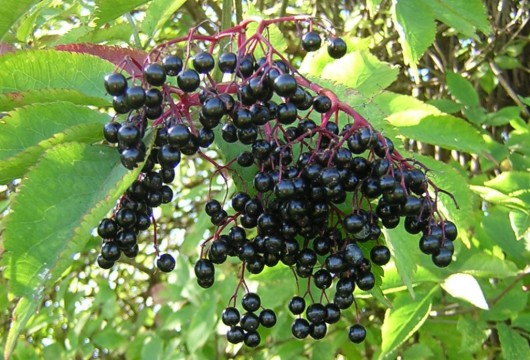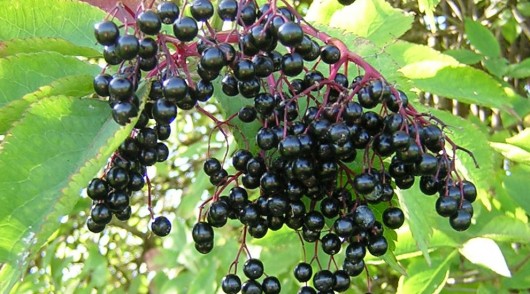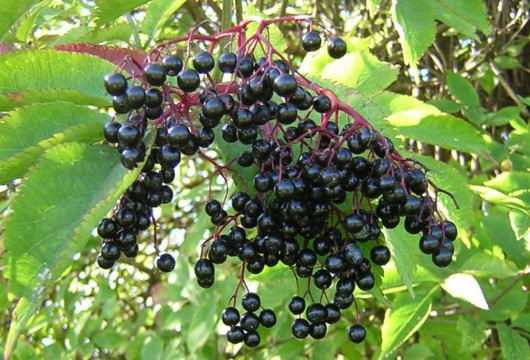Elderberries are heaving with a range of nutrients that everyone can benefit from. This berry contains fiber, vitamin A, vitamin C and many of the B vitamins. In addition, they have potassium, calcium, phosphorus, sodium and magnesium. They also contain flavanoids, carotenoids, amino acids, and tannins which all contribute to the health benefits of elderberry juice. As you can see, there are many different properties within the elderberry and each can have a major effect on your health.
Elderberries have commonly been utilized in folk medicine for treatment of various forms of illnesses. Currently Austria is the largest elderberry producing country in the world. As elderberries are edible when cooked food manufacturers of juices, jams, wines, as well as yogurts often use elderberry within their product. Recent studies have found that elderberries are strong sources of anthocyanins which is a powerful purple pigmentation that has been found to be particularly beneficial to health in many ways. Elderberries are known to have anti-inflammatory, anti-viral, and possible anti-cancerous properties. In addition, elderberries have been used in the treatment of herpes simplex and HIV as these are diseases that are directly related to the immune system.

Health Benefits of Elderberry Juice
Elderberry has been used for many years by Native Americans to treat infections of all kinds in addition to wounds. Elderberry juice or extract is commonly used to treat symptoms of the flu such as runny nose, sore throat, muscle pain and fever. In addition, elderberry is a common treatment for constipation as it has properties that work as a laxative. Elderberry has been used as a diuretic as well suggesting that it can be used for kidney health also. Elderberries promote a strong immune reaction against undesired organisms that provoke flu-like symptoms, as the berries are full of antioxidants. They not only strengthen and fortify the immune system they are also excellent sources for potassium and vitamin C. The health benefits of elderberry juice and extract are outstanding. Three of the most common uses for elderberries and elderberry extract are listed below.
• Colds & Flu: Elderberry is most commonly used in the prevention and treatment of the common cold as well as symptoms of the flu.
• Constipation: Commonly used in Europe elderberry is used as a mild laxative and diuretic for those suffering from constipation.
• Skin Infections and Irritations: When used topically elderberry can help heal many different skin ailments such as rashes and acne.
Elderberry is also thought to help lower cholesterol, improve your vision, reduce allergies, strengthen the heart, and support the respiratory system.
Skin Benefits Of of Elderberry Juice
Elderberry is known as an effective detoxifier and has been known to clear skin infections such as common sin rashes, boils, conjunctivitis, and acne. When used externally this herb is used in skin lotions as a common astringent that may help or prevent many skin infections and inflammations. The anti-aging properties within elderberry work to protect various cells from damaging free radicals.
The ancient Egyptians used the flowers of the elderberry to heal burns and improve the complexion. The anti-oxidant properties of elderberries are excellent for anti-aging remedies and many people may find cremes and moisturizers with elderberry in them to be highly effective for improving the appearance of their skin. However, consuming elderberry will likely give you the best results. Below are a few ailments in which you can use elderberry externally:
• Sprains
• Inflamed Skin
• Acne
• Arthritis
• Wounds
• Bruises
• Rashes
Forms of Elderberry
Elderberry is available in many different forms with the most common being an extracted liquid – juice. It is also available as lozenges, syrup, and capsules. The fresh elderberry plant contains a toxic chemical that is related to cyanide so it is important to never consume raw, uncooked or undeveloped elderberries. When used for a short amount of time, generally less than a week there are no known side effects of elderberry use.
Safety and Side Effects Of of Elderberry Juice
While the health benefits of elderberry juice can be remarkable, it is important to understand that large doses of elderberry can cause uncontrollable diarrhea due to its properties that work as a laxative. In addition, uncooked berries can cause nausea and vomiting and may be toxic as a result; you should only consume elderberries if they have been cooked. Pregnant and nursing women should not use elderberry as the effects if any in pregnant women have not yet been identified.


